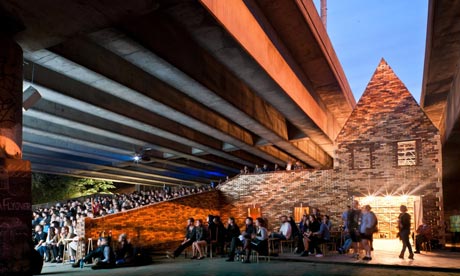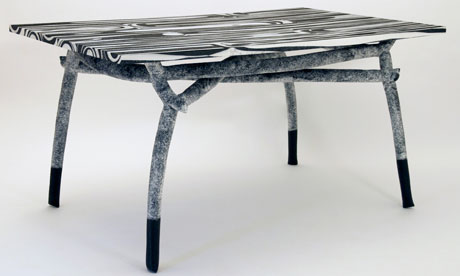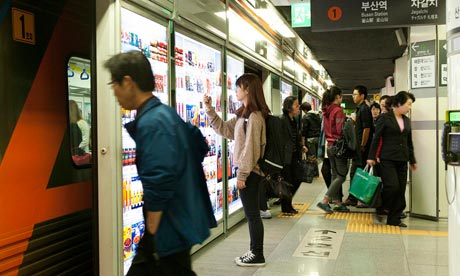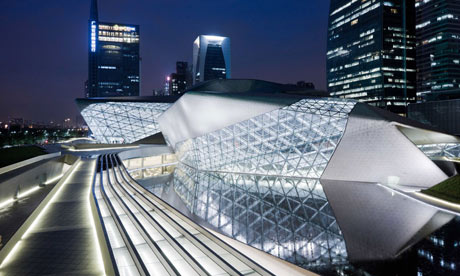年度最佳设计花落谁家?
伦敦艺术大学广州招生代表处 | 2012-02-29
What are the best Designs of the Year?
年度最佳设计花落谁家?
2012年全球最佳设计提名出炉,89件经典之作获得提名,广州大剧院榜上有名。被誉为设计奥斯卡的设计博物馆设计奖,展出这些来自全球,最具创意和进步的设计精品,涉及建筑、数字、时尚、家具、平面、产品、交通等领域。你会为哪一个投出一票?
The

When the BBC aired a radio programme last year called A History of the World in 100 Objects, it was a deserved hit. Such anthropological lists are useful story-telling devices. A similar, though more modest, project is underway at the Design Museum's Designs of the Year exhibition, which opens today. Looking through the other end of the telescope, we see the last year in 89 objects; everything from opera houses to typefaces. So what does this panoply of global design tell us about designers' current preoccupations?
Frankly, from these objects you could weave almost any narrative you like. There is media-friendly populism in the shape of the Olympic torch and lacework from Kate Middleton's wedding dress; there are consumer products (but only a few); and there is furniture of the finest craftsmanship. But what stands out is a spirit of innovation – and a growing concern with social issues.
Genuine innovation, of course, is less about inventing new objects than new processes. And so it is with Markus Kayser's Solar Sinter, a 3D printer that prints glass objects. Designed for use in desert environments, the machine draws on their two inexhaustible resources: sun and sand. A lens concentrates sunlight into a laser-strength beam that morphs sand into molten glass. The resulting objects are roughly finished but impressive given what is effectively a homemade machine. Either it's manufacturing Mad Max-style, with the attendant apocalyptic edge, or it's a more optimistic glimpse of sustainable production for the future – you choose.

Silo's Not So Expanded Polystyrene (NSEPSP) table
Experimentation with unorthodox materials runs right through the exhibition. To most people, polystyrene is the white packaging they chuck away after pulling their new computer out of the box. But one young design studio, Silo, has been turning it into furniture. They found that before it's expanded into the weightless white stuff we know so well, it's sturdy enough to make tables and chairs. Similarly, Werner Aisslinger has used moulded hemp to produce a stackable cantilevered chair, ordinarily only made out of plastic. Whether or not these experiments become commercial successes, they are reminders that products will not always look, feel or behave the way they do today.
The same goes for systems that we take for granted. If the journey home from work involves a detour for some grocery shopping, it may not for much longer. Last year, Homeplus, the South Korean arm of Tesco, opened a virtual store in a Seoul underground station. It looks much like the real thing, except the supermarket shelves are an interactive touchscreen, allowing you to choose what you want and have it delivered to your home the same day – it's a vending machine for the internet age. With Tesco's current ubiquity in the

A vending machine for the internet age ... Home plus's virtual store in
Some systems, however, lag way behind the products they support. Every year, there's a brace of electric cars in this show, but until someone designs a network of rapid refuelling stations they'll remain the next big thing in transport. Ambulances, on the other hand, never get redesigned – they haven't changed for decades, and are still primarily made to deliver patients to hospitals. Yet the prototype exhibited here, designed by a team at the Helen Hamlyn Centre for Design, allows medics to treat patients in situ. It has a more spacious interior, with a central gurney for 360 degree access (instead of crammed against the side of the vehicle) and easy to clean surfaces that prevent cross-infection. The designers estimate that it could reduce hospital admissions by 60 per cent, saving tens of millions of pounds per year. Now it just needs the NHS to invest.
Not everything is marching forward. Graphic design is in a phase of deep conservatism, fighting a rear-guard action against the digital onslaught. But this retreat into traditional values is producing some beautiful work, such as John Morgan's dignified design for the architecture journal AA Files, and reminding us what we always loved about print.

The Design Museum, fresh from unveiling its forthcoming home at the Commonwealth Institute, can dine out on the fact there is no other design exhibition quite like Designs of the Year. For one thing, it's admirably democratic – where else could you see the Guangzhou Opera House, designed by Zaha Hadid, running against a wooden folly under a flyover in Hackney? But then, to see this as an award scheme is to miss the point. It's true that a jury will have the unenviable task of picking a winner from these 89 contenders. But the real attraction of the exhibition is that it offers an annual snapshot of how the world is changing – how, through the design equivalent of natural selection, today is becoming tomorrow.
You can see the full list of nominations here. Which ones get your vote?
This year's nominations are below, visit the exhibtion blog at designsoftheyear.com
Butaro Hospital, Butaro, Rwanda
MASS Design Group
Folly for a Flyover,
Assemble, supported by The Bank of America Merrill Lynch CREATE Art Award
Zaha Hadid Architects
Hepworth
David Chipperfield Architects
Care Home,
Sergison Bates Architects LLP
Maggies Centre, Gartnavel, Glasgow,
OMA
National Park of Mali Buildings,
Diébédo Francis Kéré of Kéré Architecture
Moses Bridge, Fort de Roovere,
RO&AD Architects
Hopkins Architects
Spaceport
Foster + Partners
The Iron Market,
John McAslan + Partners
Youth Factory,
Selgascano, Gestaltskate and Jarex
BC Homepage Version 4,
BBC
Beck’s - The Green Box Project
Designed for Anheuser-Busch InBev by Mother London, Jason Bruges Studios and Motim Technologies
Face Substitution,
Arturo Castro and Kyle McDonald
Guardian iPad edition,
Guardian News and Media in consultation with Mark Porter
High Arctic, National Maritime Museum,
United Visual Artists
Homeplus Tesco Virtual Store,
Homeplus Tesco
Letter to Jane,
Tim Moore
Microsoft Kinect and Kinect SDK
Microsoft Games Studios, Microsoft Research and
Musicity,
Concept by Nick Luscombe and Simon Jordan and designed by Jump Studios
The
Written and created by Davey Wreden
Suwappu,
Alexander McQueen: Savage Beauty, The Costume Institute at the Metropolitan Museum, New York, USA
Andrew Bolton with the support of Harold Koda of The Costume Institute, New York, USA
The Duchess of
Sarah Burton for Alexander McQueen
Film for Gareth Pugh,
Directed by Ruth Hogben
Céline Autumn/Winter ’11,
Phoebe Philo at Céline
Late Night Chameleon Café,
Store design: Gary Card, Creative director: John Skelton, Brand director: Dan Mitchell
Mary Katrantzou Autumn/Winter ‘11,
Mary Katrantzou
Melissa + Gaetano Pesce Boot and Flip Flop,
Gaetano Pesce, Manufactured by
Oratory Jacket, London, UK
Will Carleysmith, Brompton Bicycle Ltd
Suno Spring/Summer ‘11,
Suno
Vivienne Westwood Ethical Fashion Africa Collection, Autumn/Winter ’11
Vivienne Westwood,
132 5. ISSEY MIYAKE
Miyake Design Studio,
Balsa Furniture,
Kihyun Kim
Chassis,
Stefan Diez
The Crates, Beijing, China
Naihan Li & Co
Earthquake Proof Table,
Arthur Brutter and Ido Bruno
Harbour Chair,
André Klauser and Ed Carpenter at Very Good & Proper,
Hemp
Werner Aisslinger
Lightwood,
Jasper Morrison
Moon Rock Tables,
Bethan Laura Wood
Not So Expanded Polystyrene (NSEPS),
Attua Aparicio & Oscar Wanless at SILO
Oak Inside,
Christien Meindertsma
Osso,
Ronan and Erwan Bouroullec
Textile Field at the
Ronan and Erwan Bouroullec,
Tip Ton,
Edward Barber & Jay Osgerby
Waver,
Konstantin Grcic
XXXX_Sofa,
Yuya Ushida
AA Files,
John Morgan Studio
Beauty is in the Street,
Four Corners Books, Cover designed by John Morgan
Book interior designed by Pierre Le Hors
Bloomberg Businessweek
The Comedy Carpet,
Gordon Young and Why Not Associates
Cover artwork and video for Join Us by They Might Be Giants,
Paul Sahre
Cut it Out,
Noma Bar
Matthew Hilton identity and website,
Spin
Nokia Pure Font,
One Thousand Cranes for
Concept by Anomaly and Unit 9,
Photo-Lettering,
House Industries
GF Smith Digital Campaign,
SEA Design
Stockmann packaging, Helskinki,
Kokoro & Moi
Self Service Magazine
Petronio Associates
What Design Can Do!,
De Designpolitie
Your Browser Sent A Request That This Server Could Not Understand,
Koen Taselaar
Ascent, Haunch of Venison,
Edward Barber and Jay Osgerby
pq Eyewear designed by Ron Arad A-frame line and Corbs line
Ron
Botanica,
Studio Formafantasma
Carbon Black Wheelchair, I Imagine,
Andrew Slorance
Defibtech Lifeline VIEW™ Automated External Defibrillator (AED), LLC
Defibtech
Heracleum, Schiedam, Netherland
Bertjan Pot powered Through Electrosandwich® By Marcel Wanders for Moooi
Hövding Invisible Cycle Helmet
Hövding
Jawbone JAMBOX,
Yves Béhar, Fuseproject
The Learning
Nest,
Mine Kafon,
Massoud Hassani
The London 2012 Olympic Torch, UK
Edward Barber and Jay Osgerby, commissioned by the London Organising Committee of the Olympic and Paralympic Games
Orb-it
Black and Decker
Shade,
Simon Heijdens
Solar Sinter,
Markus Kayser Studio
Thixotrope,
Conny Freyer, Sebastien Noel and Eva Rucki of Troika
TMA-1 Headphones
KIBiSi
Totem,
Bethan Laura Wood in collaboration with Pietro Viero
White Collection,
Ville Kokkonen
787 Dreamliner
Boeing
Autolib’ Paris, France
Bertrand Delanoë, Mayor of Paris, France
Bike Hanger - Bicycle Storage, New York, USA
Manifesto Architecture
Mia Electric Car
Mia Electric
Re-design for Emergency Ambulance, London, UK
Helen Hamlyn Centre for Design and Vehicle Design Department,Royal College of Art
T27 Electric Car, Surrey, UK
Gordon Murray Design
Taurus Electro G4
Pipistrel doo Ajdovscina
(英文信息来自伦敦艺术大学)